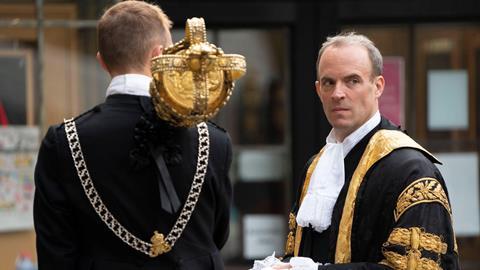A Lords report has berated the government for undermining the rule of law. But peers balked at changing how lord chancellors are appointed. They also stressed the special duties of law officers
The government has undermined the rule of law by twice knowingly introducing legislation which breaches international obligations, a widely awaited report from a committee of peers found this week. However, the House of Lords Constitution Committee shied away from recommending radical changes to the appointment of lord chancellors and government law officers.
In an 87-page report, the committee states that, while all ministers have a responsibility to the rule of law, the lord chancellor and law officers have special duties. ‘Their responsibility for the rule of law, as set out in the Constitutional Reform Act 2005 and their oath, is not limited to the maintenance of the justice system and the independence of the judiciary.’ Rather, ‘it is to ensure that rule of law issues are defended and understood by the government as a whole’.
Despite this, the committee concludes that there is no case for requiring the lord chancellor – the only ministerial position with statutory criteria for appointment – to have a legal qualification. While the lord chancellor ‘should normally be a senior legal figure’, the committee does not recommend amending the 2005 act to require a legal qualification.
Instead, it recommends that the lord chancellor’s oath be amended to include the duty to uphold, rather than merely respect, the rule of law. It also proposes that prime ministers should consider the benefits of long tenure of office when contemplating appointments.
On the most controversial change ushered in by the 2005 act, the committee suggests a new prime minister might ‘contemplate separating the role of lord chancellor from that of secretary of state for justice’, to mean that appointments could be made from outside the House of Commons. However the report acknowledges that a former lord chancellor and a former solicitor general spoke in support of the dual role.
'It is key to retaining public confidence in the law officers’ impartiality that they place their duty to the rule of law above party political considerations'
House of Lords Constitution Committee
‘Lord Garnier thought modern “large-spending” lord chancellors likely had more clout than the lord chancellors of the 20th century, while Jack Straw considered that to separate the role of lord chancellor from that of secretary of state for justice would “make the position of [lord chancellor] a shell”.’
Contrary to some predictions, the report does not recommend that law officers should not be politicians. ‘It is important that the law officers are members of a House of Parliament, so bringing an understanding of the political context in which they have to operate.’
A similar argument was made this week by a former lord chancellor and solicitor general, Sir Robert Buckland KC MP. In a foreword to a discussion paper published by thinktank Policy Exchange, Buckland and Professor Ross Cranston conclude: ‘The positive case for the continuation of the traditional arrangement for law officers as politicians is that their political background better informs them about the policy goals and priorities of the government of which they are part and the pressures it may be under.
‘It enables them to explain to colleagues more bluntly why particular avenues for action must be varied if they are to be lawful and for that advice to be more palatable and consequently implemented by its recipients. To put it another way, the political status of the law officers lends weight to any advice given since it is coming from those who share the government’s goals and aspirations and are “on its side”.’
Despite this, the constitution committee report states that ‘it is key to retaining public confidence in the law officers’ impartiality that they place their duty to the rule of law above party political considerations. Law officers should refrain from making public statements which could damage public perception of their impartiality.’
It recommends prime ministers ‘appoint only law officers with the independence of mind, autonomy and strength of character to deliver impartial legal advice to the government, even where it is unwelcome’.
It proposes that the Ministerial Code and Cabinet Manual be amended to define the officers’ duty more clearly. This should include commitment to the existing constitutional principle of the rule of law as the law officers’ principal duty; a definition of which of the law officers’ duties are ministerial in nature, and subject to collective responsibility; and the principle of parliamentary accountability. The law officers’ oaths should also be updated.
In the end, though, the rule of law will not be safeguarded by manuals. Writing for the Gazette, committee chair Baroness Drake (trade unionist Jeannie Drake) said: ‘It is vital that individuals appointed to these roles possess the authority, strength of character and independence of mind to stand up to their government colleagues, including, where necessary, the prime minister.’





































2 Readers' comments